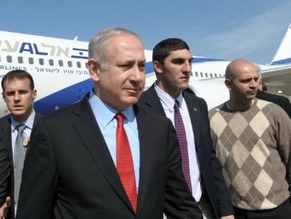|
World Jewish News

Prime Minister Benjamin Netanyahu at Ben-Gurion Airport after returning from North America trip, March 7, 2012. Photo by: GPO
|
Israel cautiously welcomes Western nuclear talks with Iran
07.03.2012, Israel and the World Israel on Wednesday cautiously welcomed the planned resumption of big-power nuclear talks with Iran, insisting that Tehran be denied the means to turn uranium into bomb fuel.
With Israel speaking increasingly loudly of resorting to military action to prevent Iran from gaining nuclear weapons, the talks could provide some respite in a crisis that has driven up oil prices and threatened to draw the United States into its third major war in a decade.
Tuesday's announcement of new talks followed a visit by Prime Minister Benjamin Netanyahu to the United States, where President Barack Obama said the talks offered a diplomatic chance to quiet the "drums of war".
"I'm very happy that they are opening discussions," said Netanyahu's national security adviser, Yaakov Amidror.
"There will be no one happier than us, and the prime minister said this in his own voice, if it emerges that in these talks Iran will give up on its military nuclear capability," he told Israel Radio.
Taking up Iran's offer of talks with the United States, Russia, China, France, Britain and Germany, EU foreign policy chief Catherine Ashton said the powers sought assurances on "the exclusively peaceful nature of Iran's nuclear program, while respecting Iran's right to the peaceful use of nuclear energy".
A date and venue for the talks have yet to be agreed.
Past contacts with Tehran, whose often secretive nuclear projects have stirred foreign suspicions of a hidden bomb program, stumbled in disputes over the scale of its uranium enrichment and stockpiling of the fissile material, which can power energy reactors and, if purified further, provide fuel for warheads.
Ahead of his White House meeting with Obama on Monday, Netanyahu demanded Iran's enrichment stop and its uranium with a higher than 3.5 percent purity, the level used for electricity generation, be removed.
Speaking separately to Army Radio, Netanyahu's cabinet secretary, Zvi Hauser, said those terms held.
Uranium bomb fuel must be enriched to 90 percent. Iran has significantly shortened any such leap in the future by enriching some of its uranium to 20 percent, saying this concentration was required to produce medical isotopes.
Netanyahu has also said Iran must dismantle an underground enrichment facility near the city of Qom, which experts say is designed to survive any air strikes, part of what Israel calls a "zone of immunity" being sought by Tehran.
Israel, widely believed to be the region's only nuclear power, has threatened to attack Iran's nuclear sites if they deem diplomacy at a dead end.
While not ruling out a U.S. military option, Obama has urged Israel not to hasten to war, saying Washington's interests were also at stake.
Iran's approach to the six world powers for talks comes as it suffers unprecedented economic pain from expanding oil and financial sanctions.
"It should be clear that without a real military alternative, the Iranians will not relent in the negotiations. And without there being a serious alternative, they will not enter the negotiations, and in any event there has to be readiness for the negotiations failing," Amidror said.
Netanyahu's spokesman Liran Dan said there had been no U.S. effort to veto or endorse any military action by Israel on Iran.
"A red light was not given. And if we're already talking about colors, then a green light was not given either," he said in remarks to both radio stations. "If there are red lines being discussed, they are not between us and the Americans, but rather, between the international community and Iran."
Haaretz.com
|
|
